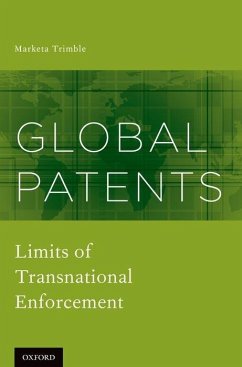This book explains why a "global patent" does not exist. It identifies the barriers to its creation from both historical and current perspectives, and discusses the difficulties that arise as inventors, investors, and businesses strive to protect their inventions in the widest territory possible. The author analyzes the options available to patent holders.
In today's globalized economy, many inventors, investors and businesses want their inventions to be protected in many, if not most, countries. However, there currently exists no single patent that will protect an invention globally, and despite the attempts in international treaties to simplify patenting, the process remains complicated, lengthy, and expensive. Furthermore, the necessity of enforcing patents in multiple countries exists without any possibility of
concentrating in one location any parallel proceedings that concern the same invention and the same parties, thus making the maintenance of parallel patents infeasible.
Global Patents: Limits of Transnational Enforcement, by Marketa Trimble, explains why the absence of a "global patent" persists, and discusses the events in the 140-year history of patent law internationalization that have shaped the solutions. The author analyzes the ways in which patent holders attempt to mitigate the problems that arise from the lack of global patent protection. One way is to concentrate enforcement in one court of
patents granted in multiple countries, which makes the enforcement of the patents less costly and more consistent. Another way is to attempt to use the litigation of a single country patent to reach acts that occur outside the country, which can mitigate the lack of patent protection outside the country. However, both the concentration of proceedings and
extraterritorial enforcement suffer from significant limitations. Global Patents explains these limitations and presents the solutions that have been proposed to address them. The book includes a thorough comparative analysis of the extraterritorial features of U.S. and German patent laws, and original statistics on U.S. patent litigation. Based on a comprehensive treatment of the various facets of transnational enforcement challenges,
the author proposes the next stage of patent law internationalization.
In today's globalized economy, many inventors, investors and businesses want their inventions to be protected in many, if not most, countries. However, there currently exists no single patent that will protect an invention globally, and despite the attempts in international treaties to simplify patenting, the process remains complicated, lengthy, and expensive. Furthermore, the necessity of enforcing patents in multiple countries exists without any possibility of
concentrating in one location any parallel proceedings that concern the same invention and the same parties, thus making the maintenance of parallel patents infeasible.
Global Patents: Limits of Transnational Enforcement, by Marketa Trimble, explains why the absence of a "global patent" persists, and discusses the events in the 140-year history of patent law internationalization that have shaped the solutions. The author analyzes the ways in which patent holders attempt to mitigate the problems that arise from the lack of global patent protection. One way is to concentrate enforcement in one court of
patents granted in multiple countries, which makes the enforcement of the patents less costly and more consistent. Another way is to attempt to use the litigation of a single country patent to reach acts that occur outside the country, which can mitigate the lack of patent protection outside the country. However, both the concentration of proceedings and
extraterritorial enforcement suffer from significant limitations. Global Patents explains these limitations and presents the solutions that have been proposed to address them. The book includes a thorough comparative analysis of the extraterritorial features of U.S. and German patent laws, and original statistics on U.S. patent litigation. Based on a comprehensive treatment of the various facets of transnational enforcement challenges,
the author proposes the next stage of patent law internationalization.








